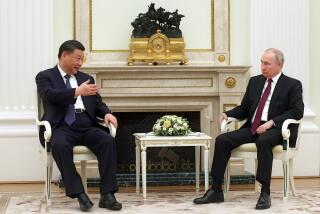Pall Over Clinton’s Russia Trip
- Share via
President Boris N. Yeltsin gave his personal assurance to President Clinton on Tuesday that economic reform in Russia remains his top priority, but that pledge is belied by events of recent days.
In firing the austerity-minded Sergei Kiriyenko only five months after naming him prime minister and restoring the old Communist apparatchik Viktor S. Chernomyrdin to the post, Yeltsin has given fresh evidence of his increasingly apparent mental confusion and of his readiness to frighten away foreign lenders and investors as he struggles to hold on to his waning political authority.
Yeltsin and Chernomyrdin have already made overtures about power sharing to the Communist majority in the parliament. Given the Communists’ refusal to support efforts to rescue Russia from the dire consequences produced by huge budget deficits, failed banks and vast corruption, this projected alliance is likely to rest on no more than a commitment to defend the status quo.
Yeltsin’s retreat from the necessity of economic reform casts a long shadow over Clinton’s planned trip to Moscow next week. One purpose of that visit was to encourage Yeltsin to adopt the changes--in tax policy, banking regulation, government spending, privatization--that would help strengthen Russia’s market economy. Scratch that item from the agenda.
Moscow’s interests now differ markedly from Washington’s in such key areas as preventing Iraq from reacquiring weapons of mass destruction and in acting vigorously to combat global terrorism, as Yeltsin’s anger over the U.S. raids on Afghanistan and Sudan showed.
Putting on a brave face, Clinton’s advisors suggest that the trip might at least let him get to know the major players in the next government. But Chernomyrdin, who was prime minister for five years, is already a known quantity, one who does not offer encouragement. He has close ties to the wealthy political string-pullers known in Russia as the oligarchs, a group dead-set against any reforms that threaten its power, its enterprises or its good relations with the Communists in the parliament.
All this matters because Russia is still something of a global player. What happens there could have wide-ranging international consequences, as ripples from its deepening economic crisis may soon demonstrate.
More to Read
Sign up for Essential California
The most important California stories and recommendations in your inbox every morning.
You may occasionally receive promotional content from the Los Angeles Times.













